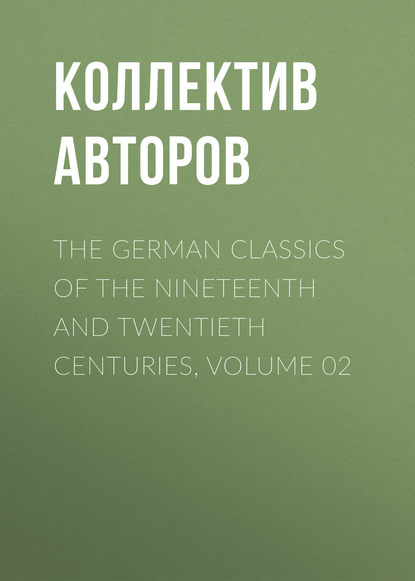По всем вопросам обращайтесь на: info@litportal.ru
(©) 2003-2024.
✖
The German Classics of the Nineteenth and Twentieth Centuries, Volume 02
Настройки чтения
Размер шрифта
Высота строк
Поля
"And there are many cases," answered she, "in which we are obliged, and in which it is the real kindness, rather to write nothing than not to write."
CHAPTER II
Edward was alone in his room. The repetition of the incidents of his life from Charlotte's lips; the representation of their mutual situation, their mutual purposes, had worked him, sensitive as he was, into a very pleasant state of mind. While close to her—while in her presence—he had felt so happy, that he had thought out a warm, kind, but quiet and indefinite epistle which he would send to the Captain. When, however, he had settled himself at his writing-table, and taken up his friend's letter to read it over once more, the sad condition of this excellent man rose again vividly before him. The feelings which had been all day distressing him again awoke, and it appeared impossible to him to leave one whom he called his friend in such painful embarrassment.
Edward was unaccustomed to deny himself anything. The only child, and consequently the spoilt child, of wealthy parents, who had persuaded him into a singular, but highly advantageous marriage with a lady far older than himself; and again by her petted and indulged in every possible way, she seeking to reward his kindness to her by the utmost liberality; after her early death his own master, traveling independently of every one, equal to all contingencies and all changes, with desires never excessive, but multiple and various—free-hearted, generous, brave, at times even noble—what was there in the world to cross or thwart him?
Hitherto, everything had gone as he desired! Charlotte had become his; he had won her at last, with an obstinate, a romantic fidelity; and now he felt himself, for the first time, contradicted, crossed in his wishes, when those wishes were to invite to his home the friend of his youth—just as he was longing, as it were, to throw open his whole heart to him. He felt annoyed, impatient; he took up his pen again and again, and as often threw it down again, because he could not make up his mind what to write. Against his wife's wishes he would not go; against her expressed desire he could not. Ill at ease as he was, it would have been impossible for him, even if he had wished, to write a quiet, easy letter. The most natural thing to do, was to put it off. In a few words, he begged his friend to forgive him for having left his letter unanswered; that day he was unable to write circumstantially; but shortly, he hoped to be able to tell him what he felt at greater length.
The next day, as they were walking to the same spot, Charlotte took the opportunity of bringing back the conversation to the subject, perhaps because she knew that there is no surer way of rooting out any plan or purpose than by often talking it over.
It was what Edward was wishing. He expressed him self in his own way, kindly and sweetly. For although, sensitive as, he was, he flamed up readily—although the vehemence with which he desired anything made him pressing, and his obstinacy made him impatient—his words were so softened by his wish to spare the feelings of those to whom he was speaking, that it was impossible not to be charmed, even when one most disagreed, with him.
This morning, he first contrived to bring Charlotte into the happiest humor, and then so disarmed her with the graceful turn which he gave to the conversation, that she cried out at last:
"You are determined that what I refused to the husband you will make me grant to the lover. At least, my dearest," she continued, "I will acknowledge that your wishes,—and the warmth and sweetness with which you express them, have not left me untouched, have not left me unmoved. You drive me to make a confession;—till now, I too have had a concealment from you; I am in exactly the same position with you, and I have hitherto been putting the same restraint on my inclination which I have been exhorting you to put on yours."
"Glad am I to hear that," said Edward. "In the married state, a difference of opinion now and then, I see, is no bad thing; we learn something of each other by it."
"You are to learn at present, then," said Charlotte, "that it is with me about Ottilie as it is with you about the Captain. The dear child is most uncomfortable at the school, and I am thoroughly uneasy about her. Luciana, my daughter, born as she is for the world, is there training hourly for the world; languages, history, everything that is taught there, she acquires with so much ease that, as it were, she learns them off at sight. She has quick natural gifts, and an excellent memory; one may almost say she forgets everything, and in a moment calls it all back again. She distinguishes herself above every one at the school with the freedom of her carriage, the grace of her movement, and the elegance of her address, and with the inborn royalty of nature makes herself the queen of the little circle there. The superior of the establishment regards her as a little divinity, who, under her hands, is shaping into excellence, and who will do her honor, gain her reputation, and bring her a large increase of pupils; the first pages of this good lady's letters, and her monthly notices of progress, are forever hymns about the excellence of such a child, which I have to translate into my own prose; while her concluding sentences about Ottilie are nothing but excuse after excuse—attempts at explaining how it can be that a girl in other respects growing up so lovely seems coming to nothing, and shows neither capacity nor accomplishment. This, and the little she has to say besides, is no riddle to me, because I can see in this dear child the same character as that of her mother, who was my own dearest friend; who grew up with myself, and whose daughter, I am certain, if I had the care of her education, would form into an exquisite creature.
"This, however, has not fallen in with our plan, and as one ought not to be picking and pulling, or for ever introducing new elements among the conditions of our lives, I think it better to bear, and to conquer as I can, even the unpleasant impression that my daughter, who knows very well that poor Ottilie is entirely dependent upon us, does not refrain from flourishing her own successes in her face, and so, to a certain extent, destroys the little good which we have done for her. Who are well trained enough never to wound others by a parade of their own advantages? and who stands so high as not at times to suffer under such a slight? In trials like these, Ottilie's character is growing in strength, but since I have clearly known the painfulness of her situation, I have been thinking over all possible ways to make some other arrangement. Every hour I am expecting an answer to my own last letter, and then I do not mean to hesitate any more. So, my dear Edward, it is with me. We have both, you see, the same sorrows to bear, touching both our hearts in the same point. Let us bear them together, since we neither of us can press our own against the other."
"We are strange creatures," said Edward, smiling. "If we can only put out of sight anything which troubles us, we fancy at once we have got rid of it. We can give up much in the large and general; but to make sacrifices in little things is a demand to which we are rarely equal. So it was with my mother,—as long as I lived with her, while a boy and a young man, she could not bear to let me be a moment out of her sight. If I was out later than usual in my ride, some misfortune must have happened to me. If I got wet through in a shower, a fever was inevitable. I traveled; I was absent from her altogether; and, at once, I scarcely seemed to belong to her. If we look at it closer," he continued, "we are both acting very foolishly, very culpably. Two very noble natures, both of which have the closest claims on our affection, we are leaving exposed to pain and distress, merely to avoid exposing ourselves to a chance of danger. If this is not to be called selfish, what is? You take Ottilie. Let me have the Captain; and, for a short period, at least, let the trial be made."
"We might venture it," said Charlotte, thoughtfully, "if the danger were only to ourselves. But do you think it prudent to bring Ottilie and the Captain into a situation where they must necessarily be so closely intimate; the Captain, a man no older than yourself, of an age (I am not saying this to flatter you) when a man becomes first capable of love and first deserving of it, and a girl of Ottilie's attractiveness?"
"I cannot conceive how you can rate Ottilie so high," replied Edward. "I can only explain it to myself by supposing her to have inherited your affection for her mother. Pretty she is, no doubt. I remember the Captain observing it to me, when we came back last year, and met her at your aunt's. Attractive she is,—she has particularly pretty eyes; but I do not know that she made the slightest impression upon me."
"That was quite proper in you," said Charlotte, "seeing that I was there; and, although she is much younger than I, the presence of your old friend had so many charms for you, that you overlooked the promise of the opening beauty. It is one of your ways; and that is one reason why it is so pleasant to live with you."
Charlotte, openly as she appeared to be speaking, was keeping back something, nevertheless; which was that at the time when Edward came first back from abroad, she had purposely thrown Ottilie in his way, to secure, if possible, so desirable a match for her protégée. For of herself, at that time, in connection with Edward, she never thought at all. The Captain, also, had a hint given to him to draw Edward's attention to her; but the latter, who was clinging determinately to his early affection for Charlotte, looked neither right nor left, and was only happy in the feeling that it was at last within his power to obtain for himself the one happiness which he so earnestly desired; and which a series of incidents had appeared to have placed forever beyond his reach.
They were on the point of descending the new grounds, in order to return to the castle, when a servant came hastily to meet them, and, with a laugh on his face, called up from below, "Will your grace be pleased to come quickly to the castle? The Herr Mittler has just galloped into the court. He shouted to us, to go all of us in search of you, and we were to ask whether there was need; 'whether there is need,' he cried after us, 'do you hear? But be quick, be quick.'"
"The odd fellow," exclaimed Edward. "But has he not come at the right time, Charlotte? Tell him, there is need,—grievous need. He must alight. See his horse taken care of. Take him into the saloon, and let him have some luncheon. We shall be with him immediately."
"Let us take the nearest way," he said to his wife, and struck into the path across the churchyard, which he usually avoided. He was not a little surprised to find here, too, traces of Charlotte's delicate hand. Sparing, as far as possible, the old monuments, she had contrived to level it, and lay it carefully out, so as to make it appear a pleasant spot on which the eye and the imagination could equally repose with pleasure. The oldest stones had each their special honor assigned them. They were ranged according to their dates along the wall, either leaning against it, or let into it, or however it could be contrived; and the string-course of the church was thus variously ornamented.
Edward was singularly affected as he came in upon it through the little wicket; he pressed Charlotte's hand, and tears started into his eyes. But these were very soon put to flight, by the appearance of their singular visitor. This gentleman had declined sitting down in the castle; he had ridden straight through the village to the churchyard gate; and then, halting, he called out to his friends, "Are you not making a fool of me? Is there need, really? If there is, I can stay till mid-day. But don't keep me. I have a great deal to do before night."
"Since you have taken the trouble to come so far," cried Edward to him, in answer, "you had better come through the gate. We meet at a solemn spot. Come and see the variety which Charlotte has thrown over its sadness."
"Inside there," called out the rider, "come I neither on horseback, nor in carriage, nor on foot. These here rest in peace: with them I have nothing to do. One day I shall be carried in feet foremost. I must bear that as I can. Is it serious, I want to know?"
"Indeed it is," cried Charlotte, "right serious. For the first time in our married lives, we are in a strait and difficulty, from which we do not know how to extricate ourselves."
"You do not look as if it were so," answered he. "But I will believe you. If you are deceiving me, for the future you shall help yourselves. Follow me quickly, my horse will be none the worse for a rest."
The three speedily found themselves in the saloon together. Luncheon was brought in, and Mittler told them what that day he had done, and was going to do. This eccentric person had in early life been a clergyman, and had distinguished himself in his office by the never-resting activity with which he contrived to make up and put an end to quarrels: quarrels in families, and quarrels between neighbors; first among the individuals immediately about him, and afterward among whole congregations, and among the country gentlemen round. While he was in the ministry, no married couple was allowed to separate; and the district courts were untroubled with either cause or process. A knowledge of the law, he was well aware, was necessary to him. He gave himself with all his might to the study of it, and very soon felt himself a match for the best trained advocate. His circle of activity extended wonderfully, and people were on the point of inducing him to move to the Residence, where he would find opportunities of exercising in the higher circles what he had begun in the lowest, when he won a considerable sum of money in a lottery. With this, he bought himself a small property. He let the ground to a tenant, and made it the centre of his operations, with the fixed determination, or rather in accordance with his old customs and inclinations, never to enter a house when there was no dispute to make up, and no help to be given. People who were superstitious about names, and about what they imported, maintained that it was his being called Mittler which drove him to take upon himself this strange employment.
Luncheon was laid on the table, and the stranger then solemnly pressed his host not to wait any longer with the disclosure which he had to make. Immediately after refreshing himself he would be obliged to leave them.
Husband and wife made a circumstantial confession; but scarcely had he caught the substance of the matter, when he started angrily up from the table, rushed out of the saloon, and ordered his horse to be saddled instantly.
"Either you do not know me, you do not understand me," he cried, "or you are sorely mischievous. Do you call this a quarrel? Is there any want of help here? Do you suppose that I am in the world to give advice? Of all occupations which man can pursue, that is the most foolish. Every man must be his own counsellor, and do what he cannot let alone. If all go well, let him be happy, let him enjoy his wisdom and his fortune; if it go ill, I am at hand to do what I can for him. The man who desires to be rid of an evil knows what he wants; but the man who desires something better than he has got is stone blind. Yes, yes, laugh as you will, he is playing blindman's-buff; perhaps he gets hold of something, but the question is what he has got hold of. Do as you will, it is all one. Invite your friends to you, or let them be, it is all the same. The most prudent plans I have seen miscarry, and the most foolish succeed. Don't split your brains about it; and if, one way or the other, evil comes of what you settle, don't fret; send for me, and you shall be helped. Till which time, I am your humble servant."
So saying, he sprang on his horse, without waiting the arrival of the coffee.
"Here you see," said Charlotte, "the small service a third person can be, when things are off their balance between two persons closely connected; we are left, if possible, more confused and more uncertain than we were."
They would both, probably, have continued hesitating some time longer, had not a letter arrived from the Captain, in reply to Edward's last. He had made up his mind to accept one of the situations which had been offered him, although it was not in the least up to his mark. He was to share the ennui of certain wealthy persons of rank, who depended on his ability to dissipate it.
Edward's keen glance saw into the whole thing, and he pictured it out in just, sharp lines.
"Can we endure to think of our friend in such a position?" he cried; "you cannot be so cruel, Charlotte."
"That strange Mittler is right after all," replied Charlotte; "all such undertakings are ventures; what will come of them it is impossible to foresee. New elements introduced among us may be fruitful in fortune or in misfortune, without our having to take credit to ourselves for one or the other. I do not feel myself firm enough to oppose you further. Let us make the experiment; only one thing I will entreat of you—that it be only for a short time. You must allow me to exert myself more than ever, to use all my influence among all my connections, to find him some position which will satisfy him in his own way."
Edward poured out the warmest expressions of gratitude. He hastened, with a light, happy heart, to write off his proposals to his friend. Charlotte, in a postscript, was to signify her approbation with her own hand, and unite her own kind entreaties with his. She wrote, with a rapid pen, pleasantly and affectionately, but yet with a sort of haste which was not usual with her; and, most unlike herself, she disfigured the paper at last with a blot of ink, which put her out of temper, and which she only made worse with her attempts to wipe it away.
Edward laughed at her about it, and, as there was still room, added a second postscript, that his friend was to see from this symptom the impatience with which he was expected, and measure the speed at which he came to them by the haste in which the letter was written.
The messenger was gone; and Edward thought he could not give a more convincing evidence of his gratitude, than in insisting again and again that Charlotte should at once send for Ottilie from the school. She said she would think about it; and, for that evening, induced Edward to join with her in the enjoyment of a little music. Charlotte played exceedingly well on the piano, Edward not quite so well on the flute. He had taken a great deal of pains with it at times; but he was without the patience, without the perseverance, which are requisite for the completely successful cultivation of such a talent; consequently, his part was done unequally, some pieces well, only perhaps too quickly—while with others he hesitated, not being quite familiar with them; so that, for any one else, it would have been difficult to have gone through a duet with him. But Charlotte knew how to manage it. She held in, or let herself be run away with, and fulfilled in this way the double part of a skilful conductor and a prudent housewife, who are able always to keep right on the whole, although particular passages will now and then fall out of order.
CHAPTER III
The Captain came, having previously written a most sensible letter, which had entirely quieted Charlotte's apprehensions. So much clearness about himself, so just an understanding of his own position and the position of his friends, promised everything which was best and happiest.
The conversation of the first few hours, as is generally the case with friends who have not met for a long time, was eager, lively, almost exhausting. Toward evening, Charlotte proposed a walk to the new grounds. The Captain was delighted with the spot, and observed every beauty which had been first brought into sight and made enjoyable by the new walks. He had a practised eye, and at the same time one easily satisfied; and although he knew very well what was really valuable, he never, as so many persons do, made people who were showing him things of their own uncomfortable, by requiring more than the circumstances admitted of, or by mentioning anything more perfect, which he remembered having seen elsewhere.
When they arrived at the summer-house, they found it dressed out for a holiday, only, indeed, with artificial flowers and evergreens, but with some pretty bunches of natural corn-ears among them, and other field and garden fruit, so as to do credit to the taste which had arranged them.
"Although my husband does not like in general to have his birthday or christening-day kept," Charlotte said, "he will not object today to these few ornaments being expended on a treble festival."
"Treble?" cried Edward.
"Yes, indeed," she replied. "Our friend's arrival here we are bound to keep as a festival; and have you never thought, either of you, that this is the day on which you were both christened? Are you not both named Otto?"
The two friends shook hands across the little table.
"You bring back to my mind," Edward said, "this little link of our boyish affection. As children, we were both called so; but when we came to be at school together, it was the cause of much confusion, and I readily made over to him all my right to the pretty laconic name."
"Wherein you were not altogether so very high-minded," said the Captain; "for I well remember that the name of Edward had then begun to please you better, from its attractive sound when spoken by certain pretty lips."
They were now sitting all three round the same table where Charlotte had spoken so vehemently against their guest's coming to them. Edward, happy as he was, did not wish to remind his wife of that time; but he could not help saying, "There is good room here for one more person."
At this moment the notes of a bugle were heard across from the castle. Full of happy thoughts and feelings as the friends all were together, the sound fell in among them with a strong force of answering harmony. They listened silently, each for the moment withdrawing into himself, and feeling doubly happy in the fair circle of which he formed a part. The pause was first broken by Edward, who started up and walked out in front of the summer-house.

















